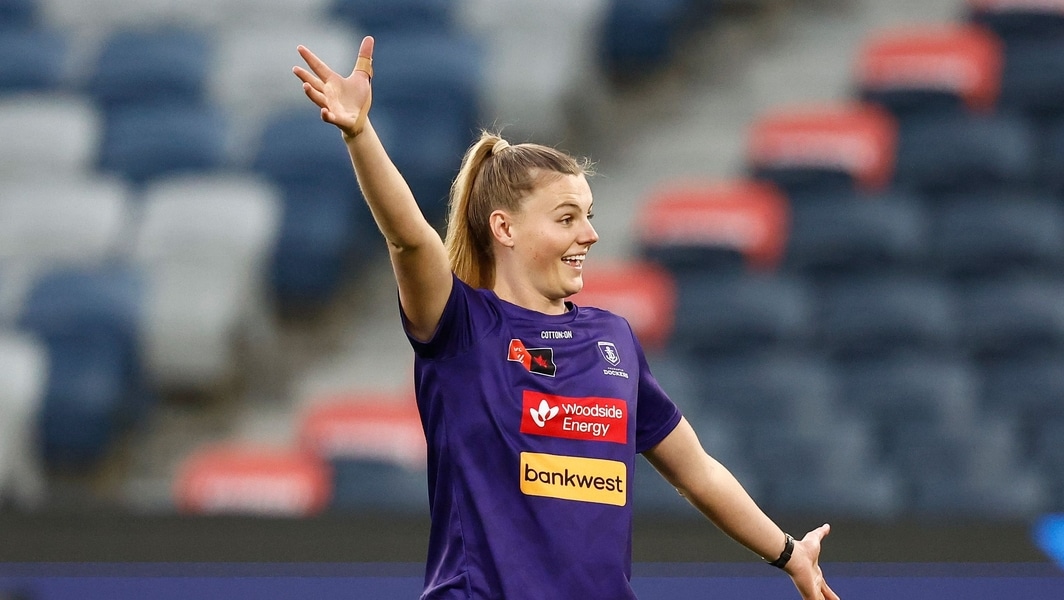WHEN Madi Scanlon was asked if she’d like to volunteer her time at a women’s prison, she didn’t hesitate.
The Fremantle half-back flanker had a friend who works at Melaleuca Women’s Prison – just 15 minutes down the road from Dockers HQ in Cockburn – and knowing Scanlon, thought she might be keen to add some variety and physical activity into the day of the inmates.
Melaleuca is a maximum-security remand and receival prison for adult women. A press release from Fremantle celebrating Scanlon’s work said up to 95 per cent of the prison population have experienced physical and sexual assault.
“She was talking about how much the girls loved watching the footy, but they didn’t have any footies in prison,” Scanlon told AFL.com.au.
“She said it’d be amazing if I could come in, kick the footy with the girls and talk to them about the importance and value in sport, and how it can offer a sense of community, camaraderie and a purpose as well. I think a lot of the women often struggle to find not only within the prison system, but once they leave, as well.”
It’s been a program that has developed since the start of 2023 and has now expanded to Boronia pre-release centre, and plenty of Scanlon’s Fremantle teammates have come aboard for the ride.
Scanlon aims to run the visits every four to six weeks, but cancellation sometimes occurs if overcrowding means a lack of staffing available for supervision.
“We don’t just run footy clinics, we do Q and As with the women, we bring in posters that we sign, we talk to them about our experiences and journeys, and we get to hear a lot about their experiences and journeys and families and what’s important to them.
“We can tailor our clinics to what they actually need – that might be a laugh and a bit of exercise, or it might just be someone to say hi and chat to them, and remind them that just because you’re in prison, it doesn’t mean you’re a bad person, and you can still go out and do things for the community and be a valued member of society.
“I’ve made some amazing connections over the years. We get reminded of the importance of having compassion for these women, and the potential of not just football, but sport, in helping with belonging, healing and service.”
Ask your average person on the street how they would feel about visiting a prison, and there’s every chance the answer would be ‘hesitant’.
“Initially, I wasn’t nervous at the concept of going into the prison, but I was nervous about how it would be received,” Scanlon said.

Madeleine Scanlon during the AFLW Round 6 match between Geelong and Fremantle at GMHBA Stadium on October 1, 2024. Picture: AFL Photos
“I didn’t want the women to feel as though it was voyeuristic, or a one-off thing. I wanted them to know I was genuinely going to invest my time and energy and make a long-term commitment, because I think that’s something they struggle with in those systems. They don’t necessarily get people who they can rely on to constantly show up for them.
“I’ve never felt unsafe in the prison. Purely because of our justice system in WA, a lot of those women might be there because they haven’t paid a fine and can’t afford to pay bail, so they end up in a holding centre like Melaleuca until they’re on trial.
“A lot of them are there because of really unfortunate circumstances or trauma. A lot are survivors of domestic and sexual violence. A lot of them just need someone to be there and say, ‘hey, we care about you’.
“The first visit was really successful, and through the power of word going round, everyone knew we were there for the right reasons. We started off with maybe 10-15 participants, and that has escalated up to 50 for some visits. Even if the women don’t want to participate, we get a lot of older women that love to sit on the sideline and heckle and be involved that way, which is really special.”
Scanlon received $20,000 after her work was recognised with the Jim Stynes Community Leadership Award late last year, which has been donated on to the Voice of Hope charity.

Madeleine Scanlon during the W Awards at Crown Palladium on November 25, 2024. Picture: AFL Photos
The organisation assists incarcerated and formerly incarcerated Indigenous women with cultural programs and connections to counselling, education and homelessness services.
Thirty of the women involved in the Voice for Hope program attended the Dreamtime match in Darwin earlier this year.
Fremantle head of AFLW Claire Heffernan – who has previous working lives as both a paramedic and a homelessness case manager – has been a close supporter of Scanlon and her program since it started.
“I’m pretty sure she’s come to every single session since she helped get this off the ground,” Scanlon said.
“After that initial visit, she said it would be amazing for our teammates to come in – not only for the women to get to meet different players, but for the girls to maybe shift their perspective around people in prison.”
Not content with her work at Melaleuca, Scanlon also volunteers with Ocean Heroes, who assist children living with autism to spend time on the beach and in the water, working up to surfing if they so choose.
The beach – with all its varying textures and the unpredictability of sand stability and the waves – can be an overwhelming and overstimulating place for neurodivergent brains.
Some of the older graduates of the program have returned as volunteers themselves, able to share their lived experiences given they understand intrinsically the challenges involved.
“Living in Perth and so close to the ocean, surfing, being confident in the water and just being at the beach has always been a really integral part of my upbringing, and I was very lucky to be brought up around the water and have that confidence and love the ocean,” Scanlon said.
View this post on Instagram
“I guess not a lot of people are given those opportunities and that can be a massive difficulty for kids on the autism spectrum – if parents aren’t confident in the water then they don’t trust themselves to get their kids in the water.
“It allows them to build that confidence in the water, make connections with new people, whether it be kids their age, or help parents connect with each other, and discover how amazing the ocean can be.
“I’ve witnessed firsthand some very inspiring transformations, like kids that are uncertain about entering the water, won’t even go in the water for their first sessions, scared of the waves, not confident, to kids that actually are surfing on their own. That can happen in three months of sessions.
“I find the ocean to be a place where I do a lot of my healing and reflection. To be able to share that love with some kids who otherwise wouldn’t have the opportunity, it means a lot to me.”
It’s an awful lot of work to manage around the schedule of a professional athlete, but Scanlon prioritises her commitments away from footy.
“It’s so important to me and means so much to me, that it doesn’t feel like a big task to kind of fit it in, I guess,” she said.
“The footy club is really supportive as well. They really are on board with all the voluntary work that I do, and they want to support me as much as they can, which means a lot to me.


